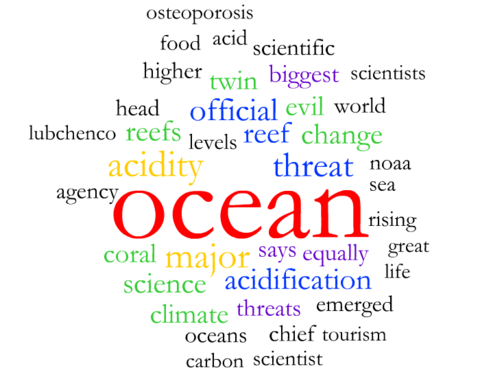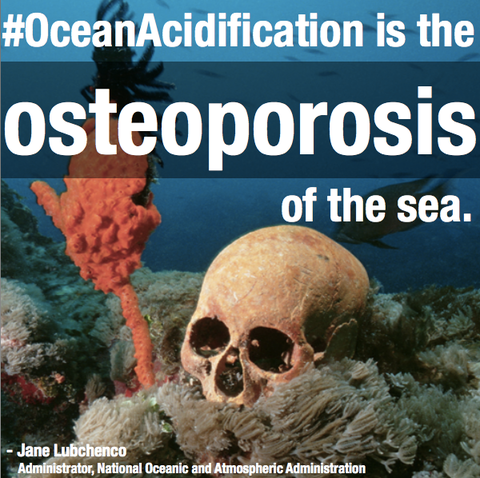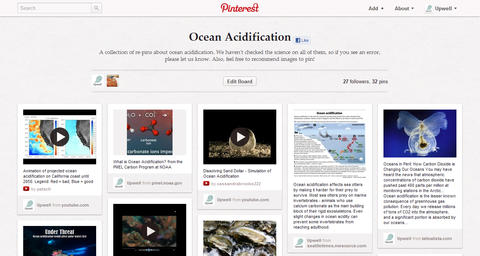Attention Toolkit: Ocean Acidification, Coral Reefs and #ICRS2012
Why Act Now?
The ocean acidification conversation is bigger online than it has been in six months because of an AP article driven by Jane Lubchenco's opening talk at ICRS.
/index.png?itok=VyD5Crur)
Social mentions of the Upwell Ocean Acidification keyword set, May 9 - July 9, 2012
There's a lot in this toolkit.
We've packed all the action-y goodies at the top, and background information at the end.
Being a Super Engager
- How To: Talk About Ocean Acidification in Public (messaging guidance)
- The Best Images and Videos to Amplify, Curated For You
- Where is the Conversation? Who to Follow on Twitter, and What Hashtags to Use
Background Information
- What is ICRS?
- What are the big issues at ICRS?
- Ocean acidification background
- Even more from Upwell (we've talked about ocean acidification before)
How To: Talk About Ocean Acidification in Public

^ How are people talking about OA online these days? The wordcloud above was generated by our resident internet trawler-in-chief using cutting-edge tools so expensive they have their own car service.
Ocean acidification... just rolls right off the tongue, doesn’t it? We’ve perused the latest in OA opinion research to bring you some tips on how to communicate OA to regular humans.
Without further ado:
- Lay the groundwork. The role of the living ocean is not well understood, help your audience understand it.
- Be human. Use pictures, analogies and local stories to establish the problem. Introduce real live people, and their stories, to humanize and localize the issue. Stress that ocean acidification is happening now (not just in the future), and that is has measurable impacts.
- Science is perceived as the credible voice on this issue. Use it.
- Activate your audience.
Want examples? Check out this How To: Talk About Ocean Acidification In Public
Say this:
✔ “oceans are the lungs of the planet”
✔ “ocean acidification is the osteoporosis of the ocean”
✔ “ocean acidiciation is changing the ocean’s chemistry”
Rather than this:
X “ocean acidification is the evil twin of climate change” [catchy but may come off as flippant]
X the words “cycles” and “resilience” (in the ocean science sense -- people think the ocean is so big it can always bounce back)
Ocean Acidification and ICRS-related Images and Videos to Amplify
We've scoured the interwebs for you, and identified the slipperiest social content, and the most liquid images to flow through your audiences.
In true Upwell style, we put together an image macro that we think is super slippery. Jane Lubchenco's quote is already getting shared widely. Pairing it with an image means it can go farther.
Why'd we choose a skull rather than a bleached coral? Following the message guidance above, we're doing our best to add a human element to the ocean acidification concept. If we hear osteoporosis, we think bones. Metaphors are GOOD. Imgur link.
We have curated additional photographs, infographics, and videos to spark conversation about ocean acidification on an Ocean Acidification pinterest board. Use these graphics and videos on your website, blog, article, Facebook and Twitter feeds, your own Pinterest boards, and wherever you roam the internet, but don’t forget to attribute them. Want an invite to join us in pinning the board? Awesome. Email us.
Upwell's Ocean Acidification pinterest board.
Here's an awesome video from World Resources Institute that provides a 4-minute primer on corals:
Here's a background video on ocean acidification from the Natural Resources Defense Council:
On Twitter
Use these hashtags:
- #ICRS2012 to talk about the coral reef symposium
- #oceanacidification to talk about... well, ocean acidification.
Twitter Lists - follow these to stay up to date:
How to Link Ocean Acidification Impacts and Sustainable Seafood
Are skinny shells a good thing? Not so much.
-
Acidifying Waters Drive Oysterman From Washington Coast to Hawaii
-
Abalone Industry Gets Monitoring Stateins in Monterey Bay
-
Once Abundant West Coast Oysters Near Extinction
What Is The ICRS?
The 12th International Coral Reef Symposium (ICRS) is taking place in Cairns, Australia from July 9 to 13. Like the Olympics, it takes place once every four years; and, also like the Olympics, it brings the best and the brightest together in one place. Unlike the Olympics, there are no javelins, high jumps or hurdles, just 2,000 or so researchers gathering to exchanging the latest informaton and cutting-edge science.
- The homepage of the ICRS, with a link to a talk by Jane Lubchenco.
- The consensus statement of over 2,600 scientists on the urgency of addressing threats to coral reefs.
What Are the Big Issues?
Coral reefs are under threat around the world. In the Caribbean, for example, 75-85 percent of the coral cover has been lost in the last 35 years. But even the Great Barrier Reef, the best-protected reef ecosystem on the planet, has seen 50 percent decline in coral cover in the last 50 years.
The reasons for these declines are multiple, including overfishing and pollution from the land, but two related topics are of increasing concern: climate change and ocean acidification.
Here's a press release about a recent paper, warning that coral reefs could be on the verge of a total ecosystem collapse as a result of climate change.
Here's a wire story in which NOAA Administrator Jane Lubchenco raises the alarm about ocean acidification.
Background Information on OA, and on corals
The ICRS Media Portal, managed by Seaweb, provides background and information on the ICRS, video briefings, contact information, and links to background documents presented at the conference, among other information.
A guide to the state of coral reefs in the US and Freely Associated States
The Status of Coral Reefs in the World.
A primer on coral reefs and climate change.
A SeaMonster blog post on how ocean acidification affects coral recruitment.
Ocean acidification kills fish, too.
OA is not OK: Summary of a series of backgrounders on Skeptical Science.
Upwell's Talked about all this before
Here’s a simple image showing the effects of ocean acidification and the resulting change in chemistry of our oceans.
Along the California coast, the steady rise of the ocean’s acidification levels have been visualized here.
The Ocean Conservancy’s George Leonard elaborates on this video in this post.
At the Rio +20 Earth Summit, the IAEA announced the creation of the International Coordinating Office for Ocean Acidification this summer.
Back in June, Beddington and Lubchenco published this Op-Ed piece in the NY Times.
You can also check out this webinar on the Galapagos Islands, a key location for studying then effects of ocean acidification on coral reefs, held on World Oceans Day by the Living Oceans Foundation.


Add a comment